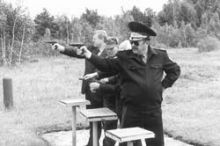On June 15 the Yavoriv Training Ground saw the beginning of Cossack Express 2001, a joint Ukrainian-British exercise. As The Day was told at the Western Operational Command press center, about 500 British servicemen and 100 Ukrainian soldiers are taking part in the exercise. However, to call it a joint exercise is to stretch the point because, according to Mykola Hutsuliak, chief of the Western Operational Command press center, the Ukrainian servicemen were mostly assisting the British to conduct their exercise. It was planned to conduct, at the first stage of the exercise, updated small-arms drills and practice firings. The second stage includes company and battalion level actions, as well as tactical platoon and company exercises using live ammunition. In particular, high on the agenda were nighttime stealth actions, platoon attack missions, pursuit of terrorist units, seizure of vantage points, and the organization of a defense.
Colonel General Serhiy Chernylevsky, Commanding Officer of the Western Operational Command, told The Day that such exercises at the Yavoriv proving ground are becoming a sort of window on the world for the Ukrainian military. For example, this year alone representatives of about fifty countries were invited to the Peace Shield exercise. In addition, he noted, Western experience in the organizational and psychological training of servicemen is also very valuable for the Ukrainian military. According to Gen. Chernylevsky, Cossack Express 2001 is a kind of prelude to Peace Shield 2001, a larger scale exercise also to be held at the Yavoriv facility. He also said the current bilateral exchange of experience is intended to be long term and aimed in the final analysis at achieving high results in the training of peacekeepers. However, it is a problem to organize this kind of exercise on the Ukrainian territory because the law On the President of Ukraine’s Decision to Admit Foreign Military Units to the Territory of Ukraine in 2001 to Participate in Multinational Exercises has not yet been passed. Yet, Borys Andresiuk, chairman of the Verkhovna Rada National Security and Defense Committee, says that parliament might give its approval as soon as Thursday, “for this law is not political, and there is understanding in parliament that it is needed.”
Meanwhile, there also is the other, material, side to this kind of exercise. The point is, People’s Deputy Andresiuk said, that budget funding makes it impossible to upgrade weaponry and re-equip Ukrainian Armed Forces facilities. For example, this year’s budget provides for only 1.1%, instead of the required 3% of GDP to finance the army, which runs to about three billion hryvnias and is “a ludicrous amount,” to quote the deputy. He also said the Armed Forces need an annual $4.6 billion to meet their minimum requirements. The joint exercise and peacekeeping missions carried out by Ukrainian soldiers make a significant contribution to Ukraine’s budget revenues. According to Mr. Andresiuk, in 1992-2001 the Ukrainian budget received more than $80 million from UN agencies alone, while peacekeeping exercise at the Yavoriv range made it possible to completely re-equip it. Moreover, monthly allocations to the Ukrainian government from the UN Secretariat for the participation of Ukrainian army contingents in the current UN missions will reach over $3 million. The parliamentary committee head claims these funds not only completely offset expenditures for the participation of our military in peacekeeping missions but also allow us to conduct exercises and train peacekeepers on our own.
Incidentally, Ukraine is now one of the world’s top ten recipient of funds for UN peacekeeping missions, ranking eighth after such, let us say, not so developed countries as Bangladesh, Kenya, Nigeria, Jordan, Ghana, etc. In other words, participation in peacekeeping operations not only promotes military cooperation and the international prestige of our state but also helps us find money for the military budget.







